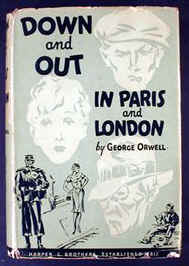
I've been reading George Orwell's "Down and Out in Paris and London," which includes harrowing, stomach-turning accounts of his experiences behind the scenes at a fancy French restaurant: oppressive working conditions, food dropped in filth, picked up, dusted off and served, exorbitant mark ups, systemic pilferage of food and drink.
At times the book uncannily echoes Tony Bourdain's "Kitchen Confidential," which makes one realize restaurant culture hasn't changed all that much since the 1930s.
Here is an especially off-putting passage:
In the kitchen, the dirt was the worst. It is not a figure of speech, it is more a mere statement of fact to say that a French cook will spit in the soup -- that is if he is not going to drink it himself. He is an artist, but his art is not cleanliness, for food, to look smart, needs dirty treatment. When a steak, for instance, is brought up for the head cook's inspection, he does not handle it with a fork. He picks it up in his fingers and slaps it down, runs his thumb around the disk and licks it to taste the gravy, runs it around again and licks again, then steps back and contemplates the piece of meat like an artist judging a picture, then presses it lovingly into place with this fat, pink fingers, every one of which he has licked a hundred times that morning. When he is satisfied, he takes a cloth and wipes his fingerprints from the dish, and hands it to the waiter. And the waiter, of course, dips his fingers into the gravy -- his nasty, greasy fingers which he is forever running through his brilliantined hair. Whenever one pays more than, say, 10 francs for a dish of meat in Paris, one may be certain it has been fingered in this manner.I'm feeling a little sick after writing that.
But the book is about far more than the disgusting realities of French bistros of the era. Based on Orwell's experiences as a tramp in Paris and London, it is a chronicle of poverty and hunger unlike anyone has experienced in the West since the Depression. Orwell's protagonist literally almost starves to death, reduced to pawning the very clothes off his back to buy a bag of potatoes or a loaf of bread and milk to survive.
As tough as things are now, the book is a useful reminder that conditions don't even remotely compare to what the poor experienced 75 years ago. Let's hope it stays that way.
Overall, the book is excellent although Orwell's idealistic socialism -- such as when he essentially argues that fancy restaurants should be shut down because they oppress lower rung workers -- renders it somewhat dated. Then again, maybe not, given recent events, Not of course that I would ever suggest shuttering the French Laundry or Le Cirque.
No comments:
Post a Comment